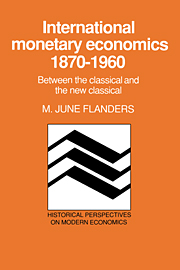Book contents
- Frontmatter
- Contents
- Preface
- 1 Preliminaries
- 2 Stream P
- 3 The beginnings of the neoclassical tradition
- 4 The locus classicus of the neoclassical position
- 5 The Macmillan Committee
- 6 A second diversion: Keynes and the Macmillan Committee
- 7 The anti-neoclassicals
- 8 Indian currency and finance: a tract on monetary reform
- 9 A treatise on money
- 10 Late Keynes: towards Bretton Woods
- 11 The crisis writers
- 3 Stream F
- 4 The confluence
- Ex post
- Bibliography
- Index
7 - The anti-neoclassicals
Published online by Cambridge University Press: 12 October 2009
- Frontmatter
- Contents
- Preface
- 1 Preliminaries
- 2 Stream P
- 3 The beginnings of the neoclassical tradition
- 4 The locus classicus of the neoclassical position
- 5 The Macmillan Committee
- 6 A second diversion: Keynes and the Macmillan Committee
- 7 The anti-neoclassicals
- 8 Indian currency and finance: a tract on monetary reform
- 9 A treatise on money
- 10 Late Keynes: towards Bretton Woods
- 11 The crisis writers
- 3 Stream F
- 4 The confluence
- Ex post
- Bibliography
- Index
Summary
I have categorized both Hayek and Hawtrey as anti-neoclassicals, in the sense that both of them accept as fact, but decry, the proposition that the world is operated very much as the neoclassicists describe it. What Hayek and Hawtrey share is a severely critical attitude toward the neoclassical position in its normative version. Both emphasize the negative effects of Bank rate policy, albeit for different reasons. While Hayek (1932 [1984]) blamed first some central banks and some economists, including Hawtrey, and later (1937) the very institution of the modern banking system, Hawtrey lays the responsibility at the door of benighted central bankers too concerned with issues which should not command their attention – namely, the level of their own reserves.
Hayek
Hayek is perhaps best described as a super-classical writer. Though he changed his views over time regarding the historical workings of the gold standard, he consistently held the position as to what the equilibrium mechanism was and how it should be allowed to function: the model was that of a full-bodied commodity currency. His model of the adjustment mechanism is one in which stable equilibrium exists and would be achieved in a fairly straightforward way if meddlesome institutions did not intercede.
The classical paradigm is clearly present throughout. In addition, he comes very close to an explicit statement of the kind of intertemporal optimization model of the balance of payments which has recently gained widespread popularity (see Chapter I, note 6).
- Type
- Chapter
- Information
- International Monetary Economics, 1870–1960Between the Classical and the New Classical, pp. 121 - 154Publisher: Cambridge University PressPrint publication year: 1990



